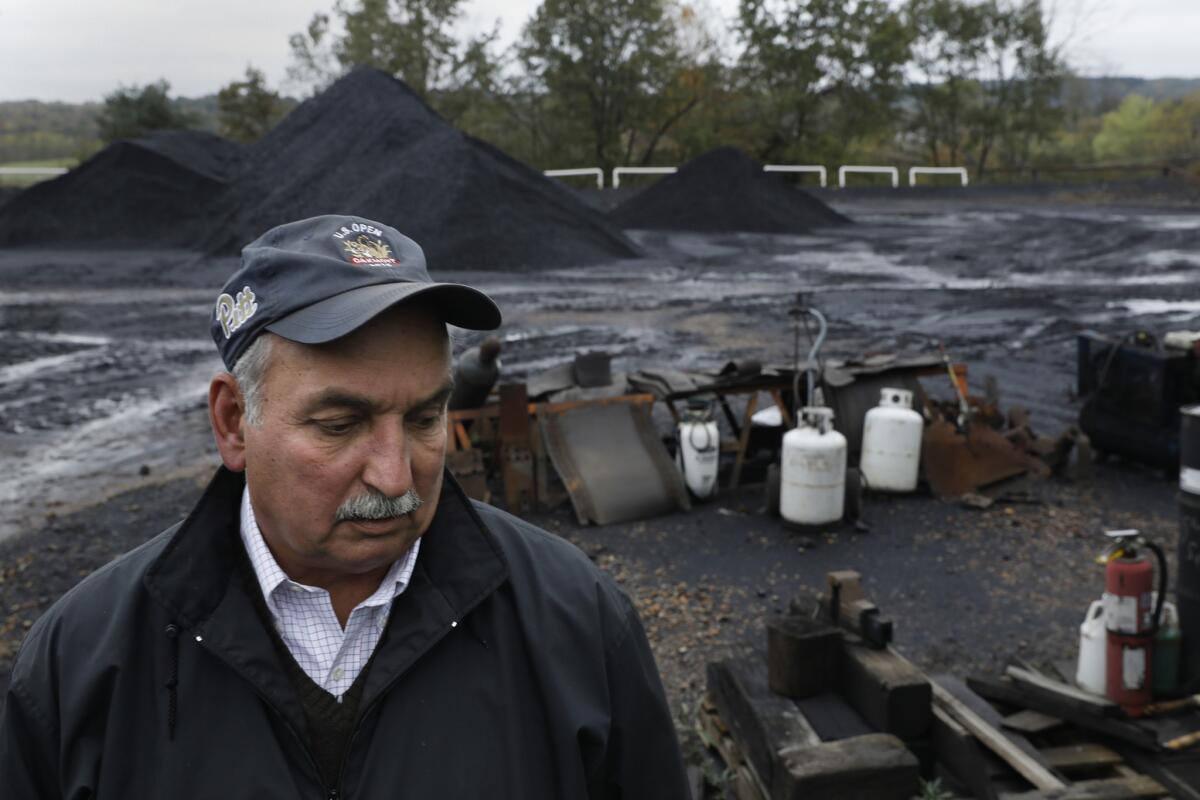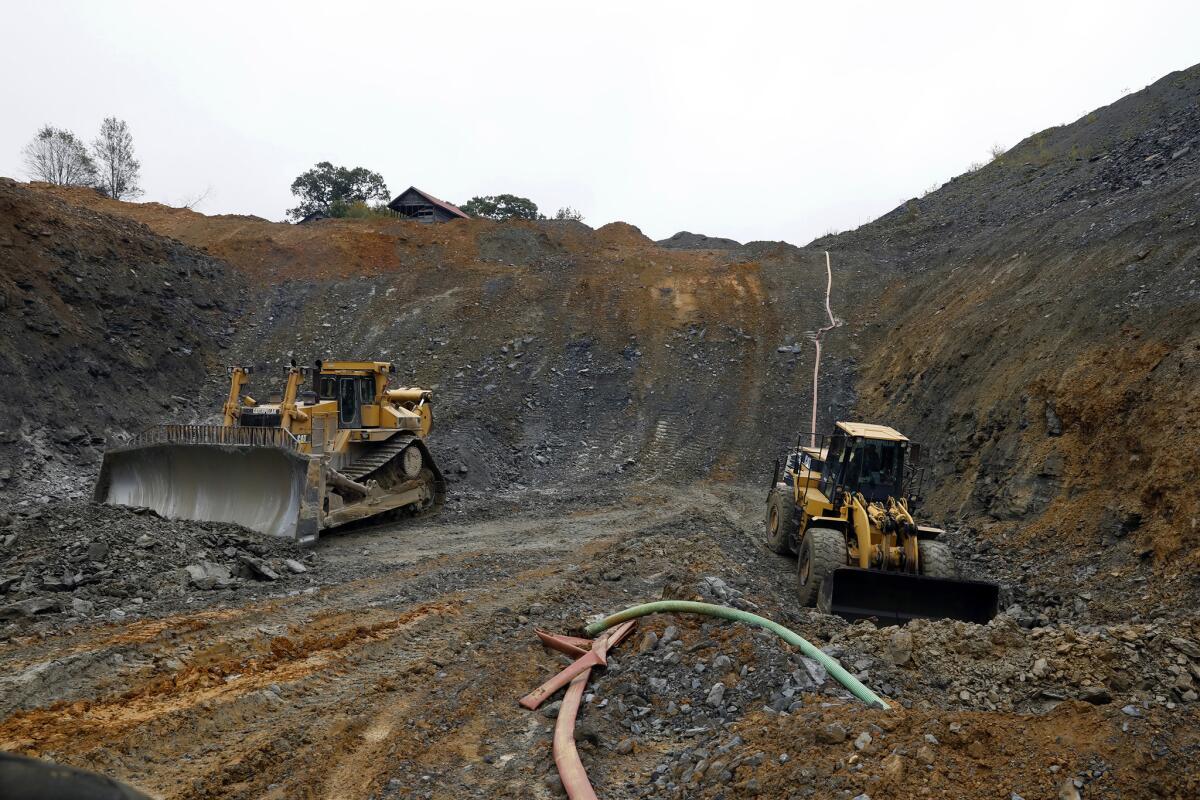Coal country is finding little relief in Trump’s climate actions

As the Trump administration dismantles one of the world’s most aggressive programs to confront climate change, it is invoking the suffering of communities like this one, where the brawny coal power plant that anchors the local economy teeters on ins
Every morning is filled with anxiety in this hardscrabble town so intertwined with the fortunes of its hulking coal power plant that a drawing of the facility is emblazoned on the community’s police force emblem.
Locals look out their windows to see if there are clouds drifting from its massive smokestacks, indicating the plant is still running. If they don’t see any, they wonder if plant owners have thrown in the towel for good.
“Everyone gets concerned when they wake up and don’t see smoke coming out,” said Rob Nymick, manager of the 1,700-resident borough that he says will be economically “crushed” if the plant goes dark.
As the
Yet as the Trump administration declares an end to what it calls the “war on coal,” Homer City isn’t any less under siege.
The plant remains an albatross to investors, and a source of increasing anxiety to the hundreds of Pennsylvanians who rely on it for their livelihood. It is likely to remain a loser financially no matter how far Trump goes in rolling back regulations.
“I’m not sold on the fact that the war on coal is putting that power plant out of business,” said Nymick, pointing to struggles to compete with cheaper natural gas, solar and wind energy. “You don’t know what to believe or who to believe.”
Other coal facilities throughout the country are also finding no salvation in the elimination of the Obama-era Clean Power Plan, which the Trump administration promised would reinvigorate them.
A fresh round of closures expected to cost at least 850 jobs was announced by Vistra Energy in Texas this week, even as the administration launched its repeal of landmark regulations on plant greenhouse gas emissions.
“The Clean Power Plan is not what hurt coal,” said Michael Wara, a professor of energy law at Stanford University. “It is hard to hurt someone more when they were already mortally wounded.”
That’s put the Trump administration in an awkward place. Even after straining to show the repeal of the Obama-era rules would boost the economy by baking into their plan financial assumptions that many experts dispute, their plan as written still doesn’t do much for the sagging coal industry.
A coal revival requires more than a Clean Power Plan repeal. It requires an outright bailout, an even less politically popular option, that the administration is also pushing. The Energy Department’s plan to force regional electricity grids to purchase large amounts of coal, unveiled days before the Clean Power Plan repeal was made public, is getting a hostile reception. Oil and gas companies are joining solar and wind advocates in working aggressively against it.
“The entire energy economics and energy law community thinks it is a crazy proposal,” Wara said of the subsidy plan. “I have not met anyone who does not have serious problems with it.”
It all leaves communities like Homer City in the lurch. At its peak, the Homer City Generating Station provided enough electricity to power 2 million homes daily on a power grid extending throughout the Northeast and deep into the Midwest. The plant generates hundreds of millions of dollars in economic activity each year.
Now it has just emerged from its second bankruptcy, and many days it is running well below half capacity. Layoffs are underway, and the consortium of bondholders saddled with the asset are scrambling to find someone — anyone — to buy it. A plant valued at $1.8 billion two decades ago might not fetch a quarter of that price now. The energy it produces just can’t compete with cheaper, abundant natural gas and renewable power.
Reality has triumphed over wishful thinking.
— Coal broker David Osikowicz

Coal broker David Osikowicz applauds the Trump administration’s enthusiasm for his industry, but even he questions what the demise of the Clean Power Plan will do to save it.
“When President Obama said five years ago that you can keep burning coal but you will go broke doing it, my instinct was to liquidate,” said Osikowicz, standing in his eerily quiet coal yard in Punxsutawney, where most of the staff has been laid off. “Unfortunately, I didn’t do that. Now reality has triumphed over wishful thinking.”
Like many others in coal country, Osikowicz feels strongly that mounting government regulations over the years sunk the region, creating burdens on coal that ultimately became insurmountable when the prices of natural gas plunged. But he also says Trump has over-promised.
“I think he meant well when he said we are gong to bring back coal, we are going to bring back the steel mines in Pittsburgh,” Osikowicz said. “Do I think that is going to happen? No.”
His brother Mark, who works loading coal in the yard, tries to take a more optimistic view. “We’ve had 24 years of presidents working against us,” he said. “It will take more than four years to bail us out.”
Five or six years ago, chatting on the bustling yard would have been impossible amid the giant trucks lined up to fill orders. It would have been too busy, loud and dangerous to stand around talking, both men say.
Now the workforce is down to a third of what it was at the coal yard and four nearby strip mines that David Osikowicz owns. The business that came from the Homer City plant, once accounting for half of all sales, is completely gone. The value of his capital investment has plummeted. Osikowicz pointed to one of the $1.5-million bulldozers he owns. The same model recently sold at a local auction for $125,000, he said.
Osikowicz is left hoping the long-shot subsidy plan the administration is proposing will prevail. He argues, like Energy Secretary Rick Perry, that regulators have favored the expansion of natural gas at the cost of national security and electricity grid resiliency.

It’s a popular view in coal country but has little support outside of it. There’s also a lot of skepticism about the effects of repealing the Clean Power Plan.
“In order to justify this, they do serious violence to established economics,” Richard Revesz, dean emeritus at New York University School of Law, said of the repeal. “The level of contortions and the attacks on standard economic principles are unprecedented.”
Revesz runs through what he sees as the absurdities — and possible legal vulnerabilities — with the Trump administration plan.
First, it assumes no benefit from the problems avoided outside of America’s borders when the U.S. pumps less greenhouse gas into the atmosphere — such as the floods, droughts and other humanitarian crises intensified by global warming worldwide, which ultimately affect the U.S. economy and national security.
The value it places on stopping warming in America is well below what most mainstream climate economists would place it at.
And the thousands of lives saved and tens of thousands of chronic illnesses averted by exceeding national air quality standards are disregarded, he notes.
The Trump administration has its own view, alleging it was the Obama administration that cooked the books to justify the climate action in the first place.
All the noise is bringing little comfort to Nymick in Homer City. He has lost faith in Washington to do anything meaningful to help his community deal with an economic crisis that is threatening to get substantially worse if the smoke stops rising from the hulking coal plant for good.
Trump’s pledges during a visit to central Pennsylvania last week that he would revive the region’s economy haven’t stopped locals from anxiously looking out their windows each morning for those plumes.
Follow me: @evanhalper
Get the L.A. Times Politics newsletter
Deeply reported insights into legislation, politics and policy from Sacramento, Washington and beyond. In your inbox three times per week.
You may occasionally receive promotional content from the Los Angeles Times.








